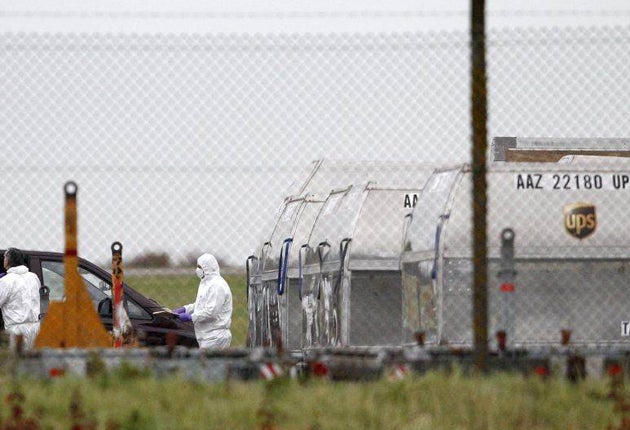Airmail bomb was 'just minutes from exploding'

Your support helps us to tell the story
From reproductive rights to climate change to Big Tech, The Independent is on the ground when the story is developing. Whether it's investigating the financials of Elon Musk's pro-Trump PAC or producing our latest documentary, 'The A Word', which shines a light on the American women fighting for reproductive rights, we know how important it is to parse out the facts from the messaging.
At such a critical moment in US history, we need reporters on the ground. Your donation allows us to keep sending journalists to speak to both sides of the story.
The Independent is trusted by Americans across the entire political spectrum. And unlike many other quality news outlets, we choose not to lock Americans out of our reporting and analysis with paywalls. We believe quality journalism should be available to everyone, paid for by those who can afford it.
Your support makes all the difference.One of the mail bombs sent from Yemen was defused just 17 minutes before it was due to explode, the interior minister of France said yesterday, as he warned of further attempts to carry out terrorist attacks.
Brice Hortefeux did not specify whether the supposed "near miss" took place in England or Dubai, where the two explosive packages were found. There had been criticism over the delay in finding the bomb at East Midlands airport, where the police failed to find it in their first sweep and had to be told to look again, at the insistence of the security services.
Authorities in the UK, however, said yesterday that forensic tests were still being carried out on the device and that it was not yet clear when it had been due to detonate. There was a similar response in the United Arab Emirates, where US analysts are carrying out similar tests.
French officials insisted that Mr Hortefeux's statement was based on reliable intelligence briefings, but refused to give out any further details. The projected timescale suggested that "al-Qa'ida in the Arabian Peninsula", the group said to be behind the plot, expected the bomb to go off on a plane, rather than at the Jewish target in Chicago to which it was dispatched, but would not have necessarily known exactly where this would take place.
The two bombs were wired to mobile phones and hidden in the toner cartridges of computer printers. The communication cards had been removed and the phones could not receive calls, officials said, making it likely that the terrorists intended the alarm or timer functions to detonate the bombs.
Intelligence officials in the US said that each bomb was attached to a syringe containing lead azide, a chemical initiator that would have detonated PETN explosives packed into each printer cartridge.
Both PETN and a syringe were used in the failed bombing last Christmas of a Detroit-bound airliner by the so-called "underpants bomber" Umar Farouk Abdulmutallab.
Yemeni authorities say they have intensified the hunt for the suspected bomb-maker, 28-year-old Saudi Ibrahim al-Asiri, but Western security sources admitted that no strong lead has emerged over his whereabouts.
Mr Hortefeux spoke about the time of detonation after French police arrested two men suspected of planning a terrorist attack. A number of people have been detained based on information received from the Saudi Government t which, it is claimed, has placed agents inside al-Qa'ida in Yemen.
"I can tell you, for example, that one of these packages was defused just 17 minutes before the planned explosion time," Mr Hortefeux said.
"Yemen is an extremely sensitive country, clearly. We know that in this part of the world there's a strong surge of al Qa'ida, of Islamic militancy. There is an Islamic militant threat, which is strong and is real."
Seven people, including five French citizens, were kidnapped by the North African wing of al-Qa'ida in September. Osama bin Laden said in a message broadcast on Al Jazeera television on 27 October that the kidnappings in Niger had been prompted by France's "unjust treatment of Muslims," including the introduction of laws banning the wearing of burqas in public.
Join our commenting forum
Join thought-provoking conversations, follow other Independent readers and see their replies
Comments